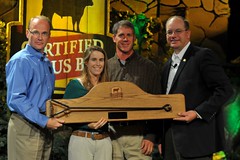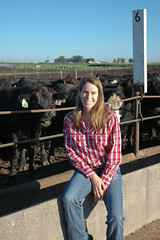Big brothers make you tough. Mine teased me unmercifully… he landed several good solid punches…he made me do pushups for at least what seemed like hours when he was supposed to be “baby-sitting”…
I think that I truly understood the full glory of the art of problem solving the day that he took a good solid shot at my stomach forgetting that I now wore a back brace. Hearing his knuckles crack against the hard plastic of the brace still brings a smile to my face…When I remember the look of shock on his face, the smile turns to a large grin…I won’t mention the fact that I might have enticed him just a little bit to take that punch knowing full well what the outcome would be…After that day, we found a new respect for one another…
Big brothers not only make you tough…they also make you SMART!
As an adult, I face many practical and “hands on” challenges caring for animals and interacting with Mother Nature. However, I find that the one challenge which takes me back to those days as a child when I grappled with the concept of “fairness for the underdog” is the public misinformation that surrounds Concentrated Animal Feeding Operations (CAFO) like mine. When less than 2% of the American population has any direct ties to a farm, it is very easy for misinformation to circulate.
Calf #718 is about the change his address as he moves from AL Ranch to my feed yard (CAFO). How much will his life change?
*He will ride in a truck for the first time for a couple of hours as he makes the journey.
*His caregivers will change from Al and Sallie and their crew to Anne and her crew.

Anne and Archie...Archie has worked for and with our family for more than 60 years. Two of his sons work at the feed yard as well. Archie was my first mentor...Archie is a surrogate "grandfather" as well...
*He will live in a different pen than the “background pen” that he has been in since weaning time, although he will still have plenty of room to express natural bovine play behavior in the new pen.
*He will be in closer proximity to animals from other herds than he was at the ranch.
*His diet will shift to a little more grain and a little less hay as he is prepared for harvest.
Does he exit the truck at my feed yard and enter a giant and evil domain sometimes known as a factory farm?
I remember clearly the first time that someone called me a “Factory Farmer”.
What exactly is a factory farm anyway?
The honest truth is that I really am not sure what exactly a “factory farm” is other than a product of someone’s imagination. Many of the descriptions that I have read in the media depict a place similar to Azkaban in Harry Potter World where the wizards are kept in prison and the jail keepers are creatures that suck the souls out of them (my favorite middle schooler is a big Harry Potter fan). As I work each day at the feed yard, I see a very different picture.
My CAFO houses cattle who are cared for by people. There is no mechanized “factory” that accomplishes this…
I began working at the feed yard as a 22 year old Ivy League graduate because I thought that raising and caring for food animals was an admirable vocation. I began blogging because I wanted to share the true story of my animal care. As “tough skinned” as my brother made me during childhood, it still bothers me terribly to be described in the same terms as the Dementors in Harry Potter.
I am an American.
I am a wife.
I am a mother.
I am a cattle caregiver.
I work at a CAFO.
I laugh, I cry, I love, I live, I care with every fiber of my being…
I hope that you think of me when you go the grocery store and look at the beef in the meat-case because it is people like me that care for cattle and raise beef.
I am not a factory…




















Check out that picture… No… Not the one with the funky wall paper. The one with Anne in a ‘Top 16 Swimmer’ shirt and her brother in the private high school powerhouse Cardinal Newman athletic shirt. Wow. Awesome memories.
Great post, Anne. Isn’t there science somewhere that states the less stress placed on a bovine creates better tasting meat? I think what you wrote dovetails into that. Human care makes a more humane farming situation for the animals and a better product for consumers. It’s win-win.
Anne,
Great way to describe our feedlot operations that are still handled by our employees and us with great care or we would not be successful. The “factory farm” tag is not for cattle producers! We care too much about each animal to allow others whom do not know how we manage, to wrongly call us a food factory. It is still a labor of love.
Big Al
LOVE this Post Anne –
This is a consumer perspective that I struggle with, and have a hard time stepping back and looking at it from their point of view.
When someone refers to raising cattle or crops as “factory farming” my first thought is “what factory farms”. I look at all of my customers (big and small), neighbors, friends, and family that produce food and fiber and I don’t see a factory I see people working hard and loving the land and livestock.
Thanks for your comments Al and Bobbi. I really appreciate the support and the feed back!
Anne
You say it so well… I will be sharing this.
My husband and I own and operate a large dairy farm with his family. We are often referred to as a “factory farm”. It is hard to hear, when we are a family run operation. We are out there everyday with our employees, caring for our cows and calves. I loved reading your post and I hope consumers will remember you and others like you when they’re in the grocery store.
Great blog and an important message to rebut the misnomer of “factory farm”.
Great post and very very important message. As a consumer it is hard to shift through the crud and the truth out there. Is all the beef I can buy in the store raised like this, how you explain above?? If not, how do you know the difference as a consumer…?
Hi Amanda,
That is a really good question. I can share with you that in my 14 years being involved in cattle farming in Nebraska that the quality of the people that care for animals and raise beef in my home state is absolutely outstanding. These are the type of people that you want for your kids to be around because they are honest and caring individuals with incredible work ethics. In the past several years, I have also had the opportunity to get to know many cattlemen from other states as well, and they also fall into this category.
My husband and I made the life choice to move back to the farm in Nebraska because we wanted to raise our kids in a small town and an agriculturally based environment. We wanted them to know where their food came from, and we wanted for them to know what their parents did everyday. It is a hard life, but it is also incredibly rewarding.
The meat case at the grocery store can be very confusing, and there also (as you noted) is quite a bit of “sensational reporting” which muddies the water as well. There is a group of cattle farmers that are working on getting a “humane handling” label through the Beef Quality Assurance program–it is a work in progress and I hope to see it come to fruition in the very near future. My feed yard participates in the Beef Quality Assurance Assessment program and, as part of that, I have a third party audit of my animal handling and care at the feedyard every year. This program defines humane at the bovine animal level (which is so very important since that is who is receiving the care and handling), and I am really excited about it. I see this as a way to give you, the consumer, confidence that what you are buying at the store is high quality product that comes from an animal who has been well cared for. I will keep you posted as this “work in progress” advances.
In the meantime, I think that you should feel good about the beef that you buy at the grocery store even without a labeling such as I just explained. My experience with cattle farmers is that they are wonderful people that do truly care about their animals.
Thanks for reading and please feel free to keep asking questions!
Anne
Anne,
That was a beautiful response to Amanda’s question. You are doing an excellent job agvocating, and spreading the message that farmers and ranchers sincerely care for their livestock.
Thank you,
Robin (ag student, agvocate and fellow beef producer)
Pingback: Meat and Agriculture: Separating Fact From Fallacy - Lift Big Eat Big